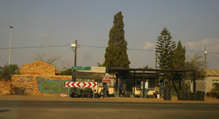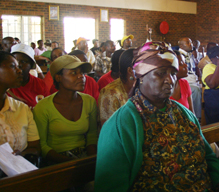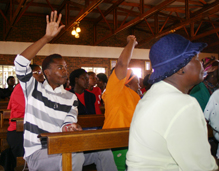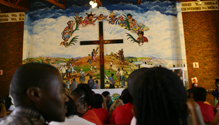
Soshanguve is a township about 45km north of Pretoria in Gauteng
Sept 12, 2008 – “When I think about how many people I have infected, I feel ashamed. I would like to apologise to all of them. Right now I’m standing in front of my community saying that I am HIV-positive. I’m trying to break the stigma. Let us rectify the mistakes we’ve made. This is the first time I have talked about my status in public and I want to thank God for giving me the courage. A chance to make a change.”
These brave words were spoken on August 27, 2008, when the Nelson Mandela Foundation returned to Soshanguve for a community conversation. This was a follow-up to a youth dialogue held in the same township in November 2007.
Last year, the young people of Soshanguve raised many issues in their discussion about HIV/AIDS prevention and care: lack of knowledge; denial; lack of training for health practitioners; sexual experimentation by young people; stigma; transactional sex; and lack of parental involvement and communication.
This year, the conversation aimed to involve all age groups in the community, to build on existing awareness and help sustain the people’s efforts to find their own solutions.
The Foundation has held a series of community conversations around the country this year, using a United Nations Development Programme methodology called Community Capacity Enhancement.
As described in other reports on this website, these dialogues involve getting community members to a meeting where they reflect on the impact HIV/AIDS has had on their lives and discuss a typical (though fictional) story of its impact on a family. These methodological tools help the community identify and express its values, concerns and resources. They then plan practical steps they can take, with the support of stakeholders in government and other organisations.
About Soshanguve
The name Soshanguve is an abbreviation of the words Sotho, Shangaan, Nguni and Venda, which are languages spoken in this township. Situated about 45km north of Pretoria in Gauteng, the township was previously designated for migrant workers. It was established in 1974 on land scheduled to be incorporated into a Bantustan bordering on Mabopane in Bophuthatswana consisting of people who were to be resettled from Atteridgeville and Mamelodi.
It later became part of the City of Tshwane Metropolitan Municipality, and was the scene of riots related to poor service delivery in January 2006. Soshanguve is an extremely disadvantaged area with extensive squatter settlements around its periphery.
In their efforts to see a different direction taken in the struggle against HIV/AIDS, the women of Soshanguve took a daring step recently. Led by the chairperson of the Township Ladies Forum, Francinah Ndala, Soshanguve was one of the first and few townships in the country to participate in the community advisory group for microbicide clinical trials.
Social mobilisation
The community conversations team was deployed in Soshanguve on August 18, 2008, with only a week to market the event and engage partners.
Structures and organisations engaged as partners in Tshwane Municipality were:
- Department of Social Development
- South African Council of Churches
- ANC Constituency Office
- Office of the Speaker
- Soshanguve Pastors’ Association
- SOSHAD
- Institute for Primary Health
- Lerato Health Care
- Thola-Ulwazi Home Based Care
- Pfunekani Community Project
- Umthombo Wempilo HBC
- Soshanguve Traditional Healers’ Association
The venue was made available at no cost by the Roman Catholic Church. The original venue had become unavailable. Holding the event in the church resulted in restrictions on what could be discussed, however, as the priest requested that condoms should not be mentioned.
Attendance
More than 230 community members attended the conversation at the St Charles Lwanga Catholic Church in Block H, Soshanguve. Most (about 62%) were adult women. Only seven male youths attended. The participants came from Soshanguve, Soutpan and Mabopane. The event lasted three and a half hours.
Storytelling
Facilitators provided a story outline for the community to discuss:
In the province of KwaZulu-Natal, in the Ixopo region, at a place called Hlokozi, live two religious families – Mthethwa and Mkhize – who attend the same church. The Mthethwa family has a daughter called Tholakele. She is 21 years old and a student at the University of Zululand. The Mkhize family has a son by the name of Zenzele. He is 27 years old and works as a teacher in Ixopo.
They are both loved in the village and have many friends. Tholakele and Zenzele have decided to get married. An announcement has been made in church and the lobola has been paid.
While they are arranging the big day, Tholakele gets sick and goes to the hospital for blood testing. After the analysis the doctor calls her into his office and informs her that she has tested positive for HIV.
Tholakele is devastated and asks herself:
- What is happening to me?
- What about my life?
- What about my marriage?
- Should I tell Zenzele?
- What can I say to my family and my community?
- Where can I find help? Should I go on treatment?
The participants put themselves in the position of the characters as follows:
Tholakele
- “We are in Rome, so I can’t speak the truth. But the thing is that I must tell the truth. As Tholakele, I’m rich and proud. Niks mapha! (I’d keep it to myself)” (Adult man)
- “It starts with me or it is started by me.” (Priest)
- “This is not the end of the world. I would consult Zenzele and then tell my parents.” (Adult woman)
- “I heard that Soshanguve is a united community, but I ask myself where is this unity everyone is talking about. The truth is there’s a lot of stigma in this community. (Applause) I would tell my mother and then I’d tell Zenzele.” (Female youth)
Zenzele
- “I would ask myself where she is as I find out I’m HIV-positive. What is she doing? Who is she sleeping with?” (Male youth)
- “I would go ahead with the wedding.” (Adult woman)
- “I would be furious but would have to understand, be prepared and stand by my partner’s side.” (Male youth)
Zenzele/Tholakele’s family
- “I speak as the brother of Zenzele; I would love and support my brother’s decision. If he decides to go on with the wedding and marry the love of his life, I would support him because he will have to live with his own decisions and I cannot make decisions for him as I won’t be there to live his life.” (Male youth) “The truth is, as family members we will start pointing fingers at each other as parents, saying ‘your child infected my child…’ That would be a waste of time though because it does not matter. As a parent I would support them. I would ask them to go for counselling and go to church.” (Adult man)
Tholakele’s community
- “We need to start promoting the right values and principles which we were raised by. As a religious community we need to promote education in our community. Our community should live with rights that will build us.” (Student minister)
Counting your losses
This process involves all the participants taking small stones to represent the lives of people they have lost, and laying them on a memorial cloth. They then share their thoughts and feelings.
In Soshanguve it was as if the session was an HIV disclosure process, that of breaking the silence. People told stories of loss, of shame and denial. Participants shared experiences they had with dying members of their families, those who had passed on and those who continued to live with social stigma.
Some of the reflections expressed:
- “I have seen three of my closest friends deal with HIV. I lost two because they did not talk until it was too late. Then my friend and I decided we should go for a test together. That’s when she found out that she was positive. We agreed to keep this between us. Her family found out when she had to start taking medication. They were very upset with me for not telling them what their child was going through. She could have died in silence. That made me think about our two friends who died in silence. We as the youth must start to talk and share. I would like to plead with the youth to start talking and supporting each other.” (Female youth)
- “When I had to put a stone at the front there, I felt sad and angry. I thought of my family members I have lost to HIV. My sister died last year. That’s when I started wanting to know as much as I could about HIV and how to deal with it. Now I am not afraid anymore. I can actually teach others and encourage them to be strong. Now my nephew is positive, and I know how to assist him better. I would like to say to people who are HIV-positive, there’s hope. Let’s prevent a further spread of HIV.” (Adult woman)
- “Sometimes when I think about my life I feel miserable, I feel sad and I feel terrible. I cannot believe my past behaviour. The way I used to change girls. When I think about how many people I have infected, I feel ashamed. I would like to apologise to all of them. Right now I’m standing in front of my community saying that I am HIV-positive. I’m trying to break the stigma. Let us rectify the mistakes we’ve made. This is the first time I have talked about my status in public and I want to thank God for giving me the courage. A chance to make a change.” (Male youth)
- “I am a mother of three and I am HIV-positive. When I found out about my status I was small and finished. Look at me now. My family used to hide me when I was sick. When my mother used to return from the shops and find me sitting outside in the sun, she’d ask me what I was doing outside and say that I should get back inside, and I would ask her why she wanted to hide me. Was she ashamed? Let’s support each other and not be ashamed of each other. A lot of people are infected but they are afraid to come out because of the stigma. I see grandmothers and grandfathers coming to take their ARVs when I go for my medication. Let us not be ashamed.” (Adult woman)
- “When I took the stone, I remembered that I have lost a father, I have lost an uncle and I have lost my only brother. At first I did not care much about HIV but now I have learnt so much about it I have started teaching others. Let’s teach each other how to be positive. As someone who is HIV-positive myself, I will not bow down to this virus. I will hear nothing from it!” (Male youth)
- “I got infected when I was 16 years old. The one time that a condom burst was the time that I got infected with HIV. Luckily I was informed about it enough. People do not disclose. I have also infected people because of denial. But now I know that we have to disclose to be safer. One thing I will say to the community is that I didn’t apply for the virus and my virus is not for sale.” (Female youth)
Challenges and successes
The venue booked (Halala Community Hall) could not be used after all and the community members who were in attendance were shuttled through to the Roman Catholic Church not far from the hall. The priest at the Roman Catholic Church gave a strict condition to the facilitation team that there would be no mention of the word “condom” inside the church.
There were comparatively few participants and not as many youth as usual.
The Health Department paid for a slot on Soshanguve Community Radio and the local municipality got involved enthusiastically.
The small crowd meant that the methodology could be followed in detail. It was also easy to hear even when the sound system wasn’t functioning.
Burning issues
The community of Soshanguve brought up these issues as their strongest concerns:
- Stigma
- Lack of support
- Encourage counselling and testing
Action committee
The day after the community conversation, the action committee that had been nominated met at the same venue. They asked for a fuller explanation of the Community Capacity Enhancement model and whether it had been used successfully elsewhere. The Foundation’s implementing partner explained that it was being tried in selected communities so that lessons could be learnt before it was extended to more areas. The committee’s need for supporting resources was also discussed and another meeting was planned.



